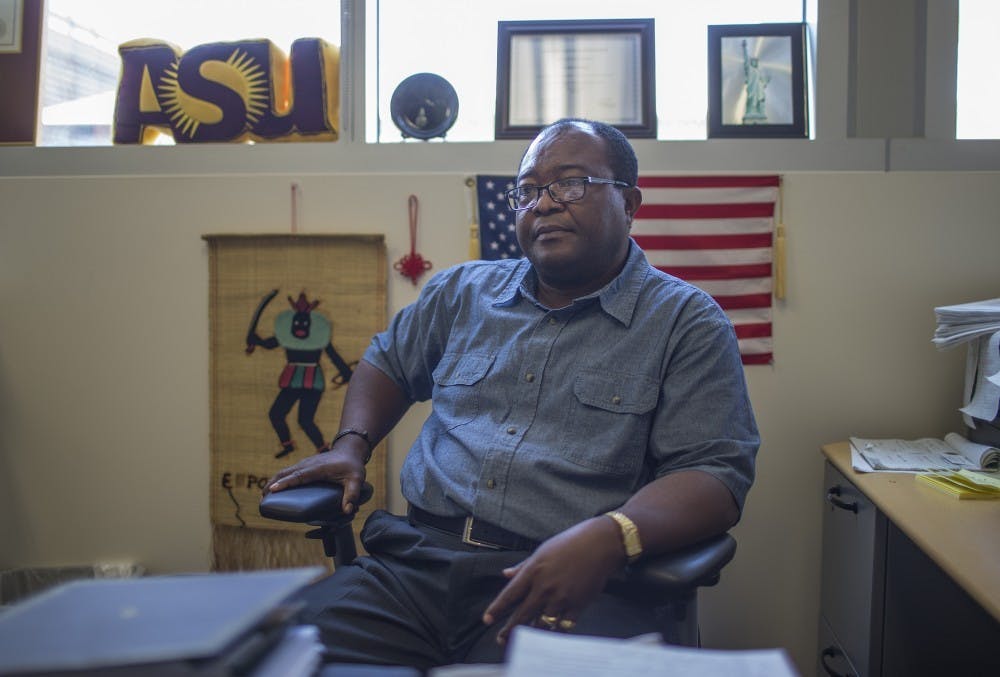In a district court this week, a jury awarded ASU faculty member Nicholas Alozie $357,000 in his lawsuit against the University and the Arizona Board of Regents, in which he claimed he had not been given a deanship because he was African American and had submitted a written statement on diversity when applying.
Alozie, a professor of public policy and social science faculty head in the College of Integrative Sciences and Arts on the Polytechnic campus, was bypassed for the dean position at the College of Letters and Sciences in 2014 for Duane Roen, a white man who stepped down from the position in June.
His complaint, filed in 2016, claimed ASU harbored a rigid faculty culture, making it difficult for minorities — especially African Americans — to obtain and stay in positions of power.
"When the jury came out and confirmed my complaint — that was vindication for me," Alozie said.
In an emailed statement, a University spokesperson said the school disagrees with the verdict.
"The only issue for the jury was his claim that he was denied a second interview in retaliation for stating his views on diversity and his criticisms during the process," the statement says. "As all witnesses testified, the sentiments Dr. Alozie shared at his interview regarding the importance of efforts to increase institutional diversity are shared by the university and his statements about diversity efforts were not the basis for the decisions about his application for the dean position."
Alozie, who has been at ASU since the '90s, said since President Michael Crow came to the University, there have been a lot of slogans purporting diversity, the recent LIFT Initiative included, but not a lot of substance. He expected Crow and other top administrators to reach out between not getting the job and filing a lawsuit, but they never did, he said.
Alozie said he felt the only way for people like him to deal with problems was in court; a sign, he said, that there was no working system to find solutions in-house.
"The president claims he has an open door policy. The provost claims he has an open door policy. What good is an open door policy when these types of matters will only end up through the legal process?" Alozie said.
READ MORE: Leadership without representation: ASU battling lawsuit, seeking to diversify
At the time Alozie filed the lawsuit, it was one of more than a dozen racial, disability and sexual discrimination lawsuits filed against ASU within the past decade. The number of lawsuits has not reduced to zero, and the University still has a way to go when it comes to equal representation between students and staff and faculty.
In Fall 2019, just under 4% of ASU's full-time staff across its four campuses were Black, while 62% were white, according to the National Center for Education Statistics. Compared to data on students from the same year, just over 4% of students were Black, while 46.5% of students were white. Students of color made up 35.7% of the total student body, while staff of color made up just 25.6% of all full-time staff in Fall 2019.
In President Crow's LIFT Initiative launched last fall he wrote the University was planning to practice "cluster hiring" of faculty from underrepresented groups to deepen expertise, and to publicize data on recruitment, retention and graduation rates of Black students and staff.
An Advisory Council on African American Affairs already has appointed members, but the initiative's focus on tenured Black faculty at Barrett, The Honors College and a postdoctoral program is unclear. A report on the initiative was expected at the end of Summer 2021, but it has yet to be distributed to students, faculty or members of the media.
"I'm not into slogans. I'm not into appearances, and things are not where they're supposed to be in terms of opportunities for African Americans," Alozie said. "We cannot be reacting. We have to be proactive in creating an environment for African Americans to succeed at ASU. I have a lot of respect for Dr. Crow, I just don't share the veneer to build an institution based on appearances."
Alozie said he still doesn't quite comprehend how the school claims it understands the point he was trying to make, one that "now a federal jury has confirmed."
When he applied for the job, Alozie's "application and his statement were a challenge to ASU's practice, culture, and policy of not employing a competitive application process for high-ranking positions, resulting in the exclusion of racial and other minorities," the complaint said.
In 2017, Alozie told The State Press he had not made a complaint saying the University had discriminated against him, rather he "made a complaint in court that a culture has developed and that culture is enabling exclusion."
"I've spent my entire adult life helping to build this institution and it's not my place to try to bring it down with what has happened here," Alozie said. "It's a sad day. It's a sad day for me. It's a sad day for ASU that it will take me such an effort to be able to say to Michael Crow, 'Something is wrong here.'"
Politics reporter Alexis Waiss contributed to this article.
Reach the reporter at pjhanse1@asu.edu and follow @piperjhansen on Twitter.
Like The State Press on Facebook and follow @statepress on Twitter.
Continue supporting student journalism and donate to The State Press today.

Piper Hansen is the digital editor-in-chief at The State Press, overseeing all digital content. Joining SP in Spring 2020, she has covered student government, housing and COVID-19. She has previously written about state politics for The Arizona Republic and the Arizona Capitol Times and covers social justice for Cronkite News.




